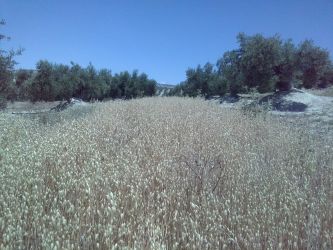The research team at the University of Cordoba presents their progress within the Diverfarming project in the days on mountain olive groves
Mountain olive groves are having a rough patch. The difficulty in mechanising them means that they are losing their position in the race for profitability, and the new super high density frameworks involving mechanical harvesting which lower costs imply a drop in the competitiveness of traditional olive groves. However, ecosystem services such as the major potential for fixing carbon in the soil (and therefore mitigating climate change), conserving the biodiversity or maintaining the population in rural areas can yet save it.
This is the theme surrounding the days of ‘Mountain olive groves: innovation and sustainable development’ held in Puente de Génave (Jaén) on the 14th and 15th of October and which were promoted by the Rural Mediterranean Association in collaboration with the Diputación de Jaén and Caja Rural de Jaén.
 In the sense of tackling the issues facing traditional olive groves, the researchers Beatriz Lozano and Manuel González from the University of Cordoba have presented their advances in the European Diverfarming project, financed by the European Commission, and which seeks to convert European agriculture into a more sustainable sector by means of including farming practices such as crop diversification. Ms. Lozano and Mr. González are studying crop diversification in a traditional olive grove in Jaen that suffers from a serious problem of soil quality due to the slope and intensive labouring for many years.
In the sense of tackling the issues facing traditional olive groves, the researchers Beatriz Lozano and Manuel González from the University of Cordoba have presented their advances in the European Diverfarming project, financed by the European Commission, and which seeks to convert European agriculture into a more sustainable sector by means of including farming practices such as crop diversification. Ms. Lozano and Mr. González are studying crop diversification in a traditional olive grove in Jaen that suffers from a serious problem of soil quality due to the slope and intensive labouring for many years.
Three types of diversification have been introduced in the wide alleys to be found between the 12x12 metre frameworks: saffron, lavender, and a mix of vetch and oats. Moreover, they have opted to not till and to reduce fertiliser use. The crops planted must meet several criteria: they must be appropriate for combination with the main crop and also that, subsequently, they have a marketable value.
In the first three years of trials, the soil quality has noticeably improved. The vegetation cover that covers the olive grove’s alleys has helped to reduce run-off, thereby slowing the impact of water on the land. The increase in organic carbon and organic matter in the soil has also increased to the point of doubling their values in some plots. With regard to harvests, in the trials to date, up to 3000kn/ha of oats have been harvested, whilst the lavender harvest has not been successful due to a lack of water.
The issue found caused a reduction in the production of the main crop in the first years (also because of the drought which coincided with the trial), however, this year the production has begun to stabilise. In this way, the researchers will seek crops and practices that are environmentally sustainable, increasing the soil quality and mitigating climate change, but which are also profitable for the agricultural community.
Diverfarming is a project financed by the Horizon 2020 Programme of the European Commission, within the challenge of “Food Security, Sustainable Agriculture and Forestry, Marine, Maritime and Inland Water Research and the Bioeconomy”, which counts on the participation of the Universities of Cartagena and Córdoba (Spain), Tuscia (Italy), Exeter and Portsmouth (United Kingdom), Wageningen (Netherlands), Trier (Germany), Pecs (Hungary) and ETH Zurich (Switzerland), the research centres Consiglio per la ricerca in agricoltura e l'analisi dell'economia agraria (Italy), the Consejo Superior de Investigaciones Científicas (Spain) and the Natural Resources Institute LUKE (Finland), the agrarian organisation ASAJA, and the companies Casalasco and Barilla (Italy), Arento, LogísticaDFM and Industrias David (Spain), Nieuw Bromo Van Tilburg and Ekoboerdeij de Lingehof (Netherlands), Weingut Dr. Frey (Germany), Nedel-Market KFT and Gere (Hungary) and Paavolan Kotijuustola and Polven Juustola (Finland).










